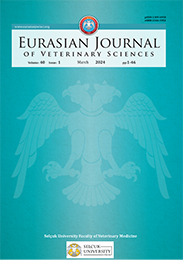| 2013, Cilt 29, Sayı 2, Sayfa(lar) 076-081 |
| [ Türkçe Özet ] [ PDF ] [ Benzer Makaleler ] |
| Investigation of Mycoplasma gallisepticum infection in layer flocks by rapid serum agglutination, culture and polymerase chain reaction methods |
| Kamile Kesler1, Leyla Güler2, Gülşen Orhan3 |
| 1Konya Veteriner Kontrol Enstitüsü Müdürlüğü, Meram, Konya, Türkiye 2Mehmet Akif Ersoy Üniversitesi, Veteriner Fakültesi, Mikrobiyoloji Anabilim Dalı, Burdur, Türkiye 3Ceren Veterinerlik ve Laboratuvar Hizmetleri, Konya, Türkiye |
| Keywords: Chicken, Mycoplasma gallisepticum, isolation, RSA, PCR |
| Downloaded:3243 - Viewed: 2791 |
|
Aim: Chronic respiratory disease of chickens caused by Mycoplasma
gallisepticum (MG) causes significant economic losses to poultry
industry due to decreased meat and egg production. In this study
MG infection in layer flocks was investigated by rapid serum
agglutination (RSA), culture and polymerase chain reaction (PCR)
methods.
Materials and Methods: A total of 375 chicken sera from 15 commercial layer flocks older than 24 weeks, 25 sera per flocks, were tested by RSA. Tracheal (before and after necropsy), air sac and lung swabs of 292 samples collected from 73 chickens were tested for MG isolation. Culture broths of 292 samples and 73 tracheal swabs directly from live chickens were tested by PCR. Results: In 13 (86.6%) of 15 flocks a seropositivity rate between 12 to 100% was detected by RSA while all sera from 2 (13.3%) of flocks were found negative. MG was isolated from 3 of 73 chickens belong to 3 (20%) flocks. In 292 culture broths, 9 of 73 chickens from 7 (46.6%) flocks and in 2 of 73 tracheal swabs of live chickens from 2 (13.3%) flocks were PCR positive. Although serology was positive in majority of flocks, detection rate of microorganism or DNA was low. When evaluated with clinical findings the results indicate a presence of chronic infection in these flocks. Conclusion: In the diagnosis of MG infection of chickens, serological tests are not sufficient alone because antibodies remain for a long time after infection. Therefore, for the diagnosis of clinical infection and therapy decisions in commercial flocks, serological findings in the flock should be supported by PCR and/or culture. |
| [ Türkçe Özet ] [ PDF ] [ Benzer Makaleler ] |




